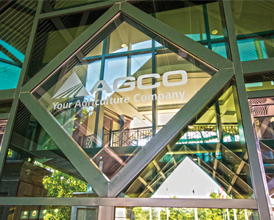
Who We Are
There’s the field where farmers use our machines. And then there’s the field of agricultural equipment makers like AGCO...And figuratively speaking, we’re doing everything we can to un-level it.
The Company:
Our Brands
Also AGCO Brands:
Also AGCO Brands:
Our Commitment
“For the farmers. For the people working for them. For ourselves. For the future.”
Delivering Technology:
A Better Future:
Materiality
Much of our thought process concerning corporate social responsibility (CSR) is informed and influenced by regular interaction with our stakeholders. These stakeholders include our employees, non-governmental organizations (NGOs), customers and farmers, suppliers, government officials, community organizations, academics and investors. Interaction, whether from employee surveys, quarterly investor calls, collaborations with research universities, or industry events, generates valuable feedback, ideas and insights. We believe that open, ongoing stakeholder communication is an essential ingredient toward developing a CSR strategy that focuses AGCO's efforts on the most critical issues.

Our Approach
Focus Areas
Some of the Company's most valuable engagement comes from our regional representatives, who have a thorough understanding of local needs. We also work through national and international organizations aligned with our position as a global industrial manufacturer and contributor to the agricultural food chain. AGCO's participation in organizations such as the Diesel Technology Forum and the European Association of Internal Combustion Engine Manufacturers, among others, contributes to our knowledge and understanding of a wide range of sustainability challenges and opportunities.
Identifying Material Issues

Our approach is strengthened by the process of conducting a materiality assessment, which led us to define issues of relevance to stakeholders and the business. The process began by capturing a broad scope of issues that were relevant to the industry and the Company itself. Those topics were then filtered to produce a short list of material issues.
From a preliminary list of economic, social and environmental issues facing AGCO, we established a short-list of potentially material issues for inclusion in the materiality matrix. The analysis was based on three elements: business impact, societal concern and level of influence. The matrix format provided a clear picture of the materiality of critical issues and how they related to one another.
As a result, key topics were identified and prioritized. These issues fall within our four focus areas: Operations, Customers, Suppliers and Philanthropy.
For a closer look at the Materiality Matrix, see our Sustainability Report.







